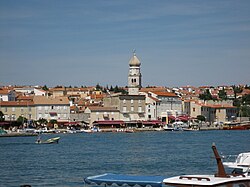Krk (town)
Krk | |
|---|---|
Town | |
 Port of Krk | |
|
Coat of arms of Krk Coat of arms | |
| Country | Croatia |
| County | Primorje-Gorski Kotar County |
| Island | Krk |
| Government | |
| • Mayor | Darijo Vasilić (PGS) |
| Elevation | 0 m (0 ft) |
| Population (2001) | |
• Total | 5,491 |
| Time zone | UTC+1 (CET) |
| • Summer (DST) | UTC+2 (CEST) |
| Postal code | 51 500 |
| Area code | 051 |
| Vehicle registration | RI |
| Website | krk.hr |
Krk ("Veglia" in Italian) is the main settlement of the island of Krk.
Characteristics
It is located on the southwest coast of the island and is the historical seat of the Roman Catholic Diocese of Krk.
The city is ancient, being among the oldest in the Adriatic. It has been continuously inhabited since Roman times and was once part of the Byzantine Theme Dalmatia after the Roman Western empire had fallen to the barbarians.
Roman ruins can be seen today in some parts of the town, for example mosaics in the houses. The city had also preserved many medieval fortifications, including Frankopan Castle close to the Komplin park, and part of the city walls built during the five centuries when the Republic of Venice ruled the city. During the venetian times the city enjoyed a huge cultural and social development.
The city was once known for its unique Romance language called Vegliotic (one of the two main branches of the extinguished Dalmatian language), which was spoken until the early 19th century.
Since a majority of its residents were Italian-speaking, the locals sought to be annexed to the Kingdom of Italy, but Italy eventually decided to cede the island to Yugoslavia in 1921, and many of its Italian-speaking residents subsequently left for Istria and the rest of Italy.
Indeed the city was 90% Italian speaking until WWI, when was created the Kingdom of Jugoslavia and many Croats moved to the area.[1]
The city was temporarily occupied by D'Annunzio in 1921 and twenty years later integrated into the Italian Governatorate of Dalmatia between 1941 and 1943. Tito's partizans entered in the city in 1944 and since then the Croatian population has become the main of Krk.
Even now -after the exodus following WWII- there it is still a small autochthonous Italian community, represented within the "Unione Italiana" of Croatia.[2]
References
See also
External links

